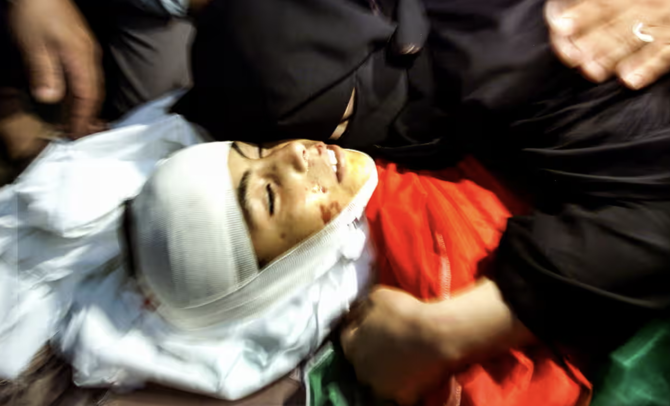LONDON: Doctors in Gaza are treating a significant number of children for severe injuries which they believe result from deliberate targeting by Israeli snipers, The Guardian reported on Tuesday.
According to the Palestinian Ministry of Health, children make up more than a third of the 32,000 deaths resulting from Israel’s prolonged assault on Gaza, with many more sustaining serious injuries.
The Guardian has received detailed accounts from nine doctors — the majority of whom are foreign volunteers — about their experiences in Gaza’s hospitals this year. They consistently observed that the majority of the children’s injuries were caused by shrapnel or burns from Israel’s widespread bombing of residential areas, sometimes resulting in the loss of entire families.
Additionally, some fatalities and injuries were due to collapsing buildings, with other victims still unaccounted for beneath the debris.
However, these doctors have also been treating a continuous flow of non-combatants, including children and elderly people, for gunshot wounds to the head or chest.
Dr. Vanita Gupta, an intensive care physician from a hospital in New York, volunteered at Gaza’s European Hospital in January. One morning she encountered the arrival of three critically injured children. Their families informed Gupta that while the children were together on the street, they were shot despite no other gunfire reported in the vicinity.
Gupta said: “One child, I could see there, was shot in the head. They were doing CPR on this 5 or 6-year-old who (had) obviously died.
“There was another little girl about the same age. I saw a bullet entry wound on her head. Her father was there, crying and asking me ‘Can you save her? She’s my only child’.”
Gupta said that a third child also had a shot to the head and was sent for a CT scan. She said: “The neurosurgeon looked and said, ‘There’s no hope.’ You could see the bullet had gone through the head. I don’t know how old he was, but young.”
Some physicians attribute the specific types and locations of these wounds — combined with the accounts from Palestinians taking their children for treatment — to deliberate targeting by Israeli forces. While some doctors are uncertain of the circumstances leading to these shootings, they are alarmed by the number of children grievously wounded or killed by precision shots, often inflicted by high-caliber bullets that cause significant damage to their young bodies.
A panel of UN experts condemned the Israeli military in February for allegedly targeting Palestinian civilians, including children, who were clearly not combatants and were seeking shelter.
The group said: “We are shocked by reports of the deliberate targeting and extrajudicial killing of Palestinian women and children in places where they sought refuge, or while fleeing. Some of them were reportedly holding white pieces of cloth when they were killed by the Israeli army or affiliated forces.”
After consulting military experts and forensic pathologists regarding descriptions and images of gunshot wounds suffered by eight children, The Guardian report said it was challenging to definitively ascertain the circumstances of the incidents. However, in some instances, the ammunition identified was consistent with that used by the Israeli military.
Eyewitness accounts and video recordings support allegations that Israeli soldiers have targeted civilians, including children, in scenarios unrelated to combat with Hamas or other armed factions.
In certain situations, individuals reported being shot at despite signaling peace with white flags. Reports in Haaretz indicate that Israel has a history of engaging civilians in areas declared “combat zones” by its military.
The Israel Defense Forces are known to deploy snipers or “sharpshooters” as part of their elite units during combat operations, and have faced long-standing accusations of such sharpshooters targeting unarmed Palestinians, including children, in both Gaza and the West Bank.
























